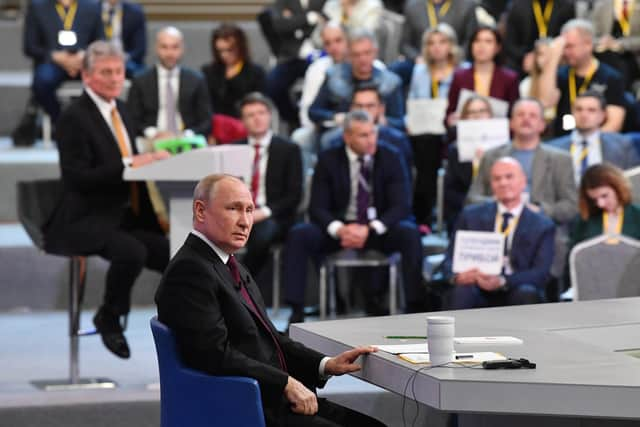Russian president Vladimir Putin uses rare press conference to say goals in Ukraine remain the same, no peace until achieved
Russian President Vladimir Putin began his end-of-year news conference with a question about Ukraine, vowing that his goals remain the same and there would be no peace until they are achieved. By Harriet Morris Published 14th Dec 2023, 11:33 GMT
Mr Putin was greeted with applause as he arrived in the hall in central Moscow[1], a short distance from the Kremlin. This year, ordinary citizens have the chance to phone in questions along with those asked by journalists, and Russians have been submitting questions for Mr Putin for two weeks. Key themes are expected to be the fighting in Ukraine[2], payments to soldiers and their families and the economy, Russian state journalists said.

 Russian president Vladimir Putin holding his year-end press conference at Gostiny Dvor exhibition hall in central Moscow. Picture: Alexander Kazakov/AFP via Getty Images
Russian president Vladimir Putin holding his year-end press conference at Gostiny Dvor exhibition hall in central Moscow. Picture: Alexander Kazakov/AFP via Getty ImagesIndeed, the first question was about Ukraine.
Mr Putin said on Thursday that Moscow's goals - "de-Nazification, de-militarisation and a neutral status" of the country - remain unchanged. He spelled out the goals, as he did the day he sent troops to Ukraine in February 2022. "De-Nazification" refers to Russia's allegations the Ukrainian government is heavily influenced by radical nationalist and neo-Nazi groups.
The claim is derided by Ukraine and the West. Mr Putin has also demanded that Ukraine remain neutral - and not join the Nato alliance. "There will be peace when we will achieve our goals," Mr Putin said.
The Kremlin has since repeatedly said the "special military operation" in Ukraine will continue until those loosely defined goals are achieved. President[3] Putin also said some 244,000 Russian troops who were called up to fight in Ukraine are on the battlefield. Mr Putin said the Kremlin does not need a second wave of mobilisation of reservists, with 1,500 men recruited into the army every day across the country.
As of Wednesday evening, a total of 486,000 soldiers have signed a contract with the Russian military, Mr Putin said. He did not give a total number of troops fighting in Ukraine. "Why mobilisation?
There is no need," he said. Mr Putin, who has held power for nearly 24 years, said last week that he was running for re-election in March. Last year, he did not hold his usual call-in show with ordinary Russians or his traditional session with reporters.
In addition, his annual state-of-the-nation address was delayed until February of this year. His last news conference was in 2021 amid US warnings that Russia was on the brink of sending troops into Ukraine. Mr Putin has heavily limited his interaction with the foreign media since the fighting began, but international journalists were invited this year.
With the future of western aid to Ukraine in doubt and another winter of fighting looming, neither side has managed to make significant battlefield gains recently.
Ukrainian president Volodymyr Zelensky[4] travelled to Washington on Tuesday and made an impassioned plea for more US aid and weaponry.
Mr Putin's appearance is primarily aimed at a domestic audience and will be a chance for him to personally resolve the problems of ordinary Russian citizens and reinforce his grip on power ahead of the March 17 election.